The Counter-Disinformation Industry Promotes Left-wing Groupthink, Not Truth
How I got out of the industry, and how you can protect yourself from it
Truth and disinformation
THE COUNTER-DISINFORMATION INDUSTRY PROMOTES LEFT-WING GROUPTHINK, NOT TRUTH
How I got out of the industry, and how you can protect yourself from it
A few years ago, as funders started throwing money at anyone willing to address the purported role of disinformation in Donald Trump’s 2016 election, many advocacy organizations, academics, political operatives, and media professionals dove into the counter-disinformation business. As a former employee of one such organization and later as an independent consultant and trainer, I saw that business up close. While I'll always support individuals and organizations doing responsible work to overcome divisiveness and deception in civic life, I feel the need to warn people about the dishonest and partisan industry that has sprung up around “fighting disinformation.”
My encounter with Groupthink, Inc.
I’m a storyteller, strategist, trainer, and educator dedicated to civil and human rights, whose practice is rooted in social and cognitive psychology. I’ve been working on digital platforms since their invention. There, I’ve spent years contending with how age-old political manipulation tactics manifest in new media environments.
This background gave me some unique opportunities to work alongside researchers and practitioners formalizing the study of mis-, dis- and malinformation. In turn, this eventually led to opportunities to work within the “counter-disinformation” field. Some independent reporters have dubbed this field the “censorship-industrial complex.” I like to think of it as the enforcement wing of Groupthink, Inc.
Groupthink, Inc. is the cumulative effect of the subset of academics, activists, political operatives, and media professionals devoted to the manufacture, marketing, and enforcement of a social and political consensus that flatters their self-perceptions, aligns with their ideological preferences, and exalts them into positions of undeserved power. These academics, activists, operatives, and media people, supported by funding from Big Philanthropy and the government, have pushed identity politics, luxury beliefs, and all manner of related nonsense on Western societies over the past few decades, particularly since the mid-2010s. Their efforts have created a manufactured consensus about race, gender, sexuality, class, and innumerable other topics. (See Figure 1.)
In hindsight, I should have known from the jump that the field of counter-disinformation would be a mess. How, exactly, could an industry populated primarily by people who espouse the postmodernist belief that “all truth is relative” effectively oppose the rise of “alternative facts”? They are two sides of the same counterfeit coin.
However, when I entered the counter-disinformation field, circa 2019, I was still too caught up in the leftwing worldview that pervades it to recognize the inherent problem. Plus, my entry into the industry started out plausibly enough, initially around clearly-defined civic processes. Did I want to do something about bad actors telling confused voters the wrong election dates or scaring them out of being counted in the Census? Of course I did. And especially post-2020, as I became increasingly disillusioned by partisan/ideologically-driven advocacy but unsure of what to do with myself, I was excited to use my skills as a narrative strategist to boost what should ideally have been nonpartisan efforts.
But as the efforts in which I found myself engaged sprawled to ever hazier, more partisan and ideologically-driven topics, the more frustrated and troubled I became. One thing that really pushed me over the edge was the conversation that arose when The Washington Post (Figure 2) shamed women for allegedly spreading misinformation about birth control pills on the internet. These women were taking to TikTok and other platforms to discuss the weight gain, anxiety, and depression they experienced after starting hormonal birth control…all of which is information that you can literally find on these medications’ package inserts.
By labelling these women’s accounts of their experiences “misinformation,” The Washington Post abused the term. We live in an age of informational warfare and it is critical that we have accurate terms and language to discuss this phenomenon so that we can deal with it. But a variety of actors, including media organizations like The Washington Post, seem to be working overtime to render that language meaningless by attaching terms like “misinformation” and “disinformation” to anything that doesn’t fit their political prejudices, their financial interests, or their cultural preferences. In the process, they are destroying public trust in the media and our other collective sense-making institutions.
As time went on and I continued to question myself, my industry colleagues, and the shaky academic foundation our counter-disinformation work was built upon, it eventually became undeniably clear that regardless of their stated intentions, people working in this industry are fundamentally unable to do what they claim they’re trying to do. Why?
Why the counter-disinformation industry fails
For starters, people who adhere to an ideological framework—leftism, progressivism, wokism, whatever you want to call it—that’s grounded in an assumption that there is no such thing as objective truth have literally no basis to label anything as mis- or disinformation. (A clear example of this conflict can be seen in their embrace of the hollow, ever-shifting concept of “gender” over the stable, powerful reality of biological sex.) In order to even begin to approach this work with any kind of consistency, the overwhelming majority of people working in this field would have to abandon their ideological priors. I don’t see that happening anytime soon.
Moreover, their unwillingness to consider that they or the “experts” they agree with might be wrong, to humbly listen to those they disagree with, to be appropriately skeptical of politically-aligned public officials, or to remain curious about what objective evidence actually shows us about various issues makes it all but impossible for them to consistently distinguish truth from falsehood even if they earnestly wanted to. Indeed, while I still think most people working in this field genuinely want to be helpful, their hubris undercuts even their best intentions.
Intentionally or not, by deciding in advance that they know what kinds of people are or are not credible, rather than seeking and following actual evidence wherever it leads, they’ve shielded themselves from feedback from reality while replicating the same problem that already exists at multiple levels of our sense-making institutions: when they’re not busy denying that truth exists, they’re mistaking a manufactured consensus for truth. Worse, their attempts to police so-called “mis-” and “disinformation” (which, in practice, means anything that deviates from that distorted consensus) essentially extend that shield against reality to the rest of society. As we’ve seen again and again over the past few years, that’s had serious consequences for our health, safety, and freedom of expression.
I know much of this comes as no surprise to independent or conservative observers of the disinformation industry over the past few years, and I hope you’ll take some comfort in a bit of confirmation and validation from a former participant. But I’m speaking up now primarily for the sake of folks who may have missed—or more likely, dismissed—existing reporting or investigations because they came from people whose perspectives you’ve been conditioned by Groupthink, Inc. to ignore or mistrust. If you can’t hear it from them, perhaps you can hear it from me: someone who truly wanted to believe the best about these efforts, but was eventually so frustrated by what I saw that I forfeited income rather than continue to participate in it.
Left-wing bias in the counter-disinformation industry
Many journalists, researchers, and other professionals working in and around the counter-disinformation industry claim and earnestly believe, like I once did, that they are doing important work to protect freedom, fight bigotry, and clean up our information environment. From what I’ve seen, there isn’t any grand conspiracy here so much as a deeply prideful failure to consider the shortcomings of their own and their peers’ knowledge, or their own biases.
And those biases are significant. This field is heavily dominated by people on the left. I have watched people in the counter-disinformation industry take significant precautions to protect themselves from public scrutiny, which they typically dismiss as right-wing attacks, regardless of the political affiliation of those trying to scrutinize them. But I have never seen anybody in this field take any steps to protect the public from the impact of their own biases. I’ve encountered multiple squads of researchers and firms using very sophisticated technology to monitor alleged disinformation, but they’re almost exclusively focused on right-leaning targets, instead of scanning for false and misleading information from every political perspective.
Even more troubling, I have yet to encounter a counter-disinformation researcher whose job it was to independently verify what exactly counts as accurate information versus what constitutes dis- or misinformation. Instead, their default stance is to take the words of “experts” or public officials as fact, if they even stop to consider what’s true versus false at all.
Now, that’s not necessarily a big deal when it comes to concrete, clearly defined things like election dates or census-taking processes. But it’s a huge deal when it comes to rapidly changing and uncertain issues like pandemic response, nuanced issues like climate science, or ideologically-inflected issues like how to help children who say they’re distressed about their biological sex. On issues like these many in the counter-disinformation space have actively spread misinformation while suppressing better information that challenges their political preferences and biases.
Likewise, it is really important to recognize that especially in abstract academic fields that don’t have clear-cut, objective standards, the “experts” are a pretty ideologically slanted group. For decades now, left-leaning academics and professionals have dominated research spaces in most academic fields (see Figure 3), while activists on both ends of the political spectrum have waged campaigns, often vicious, against researchers whose findings they consider inconvenient. What emerges as expert consensus under these distorted and distorting conditions can’t just be assumed to be accurate. Those pressures toward conformity, censorship, and self-censorship affect who is given opportunities to do research, what kinds of questions they feel free to pursue, how they interpret their findings, and how they present those findings or whether they even do present them.
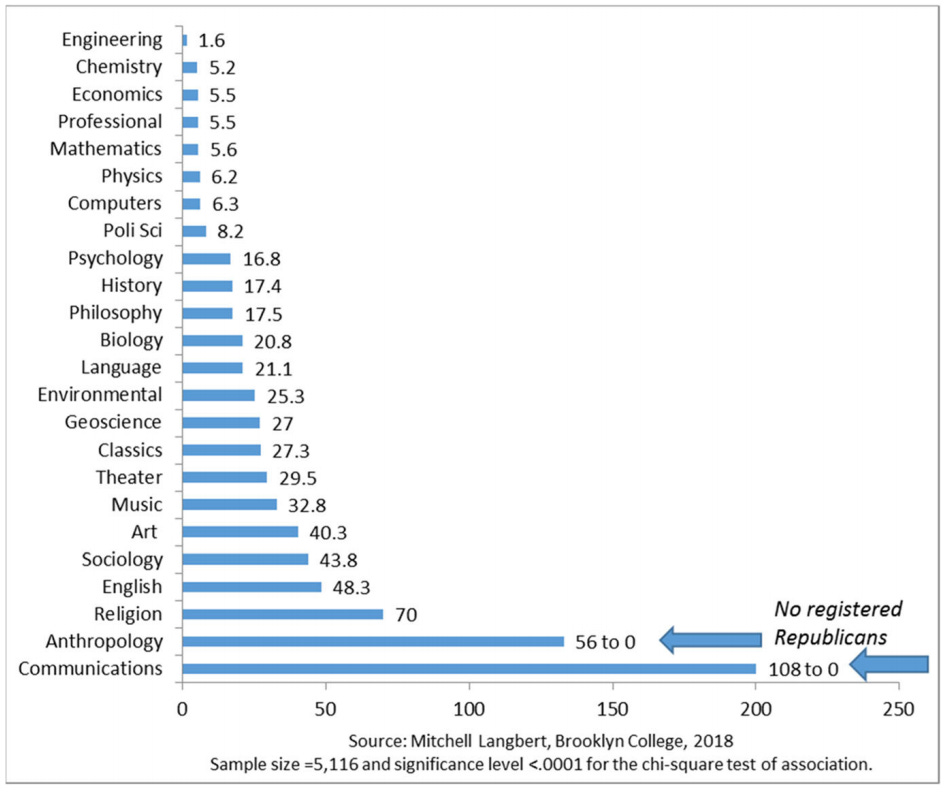
Consensus vs. truth
It’s crucial to remember that consensus and truth are two different things. Consensus can emerge around true observations of reality, but expert consensus on complex issues, or on simple issues that have been made to seem complex by people with misguided beliefs or agendas, can also emerge as a result of excluding dissenting voices, pressuring people to conform for fear of losing relationships or careers, or even threats to their safety.
I’ve yet to encounter other people in this counter-disinformation space who actually stopped to consider this distinction between consensus and truth. When I asked disinformation-industry folks how they discern truth, I was repeatedly told that I was the first person they’d encountered in this space to even ask those kinds of questions. None of them had solid answers, yet that didn’t stop any of them from accepting huge grants and contracts, continuing to advise influential organizations and campaigns, or attempting to influence laws and platform policies governing Big Tech across multiple continents.
And that’s really my biggest concern. For too many people in this industry, ideological conformity preempts the pursuit of evidence. They are so used to ideologically skewed campuses and professional organizations, and so accustomed to hearing certain perspectives and opinions echoed throughout the media and culture, that they reflexively treat ideas that conform to their political and ideological expectations as being synonymous with truth itself. And then they partner with other influential organizations, media outlets, public officials, and Big Tech to enforce that conformity, stifling the free flow of information we need to make important personal and collective decisions. Pressure from people in networks like these are why tech platforms sometimes hide, demonetize, or just ban content and users that challenge deceptive activist dogma presented as expert consensus on issues like gender ideology or abortion. It’s why even accomplished experts with robust evidence-based findings have been stifled for challenging powerful people’s preferred narratives on things like pandemic response or environmental policy.
This has had serious costs for many people. From the vulnerable young people whose bodies are permanently damaged by harmful drugs and surgeries, to the scholars whose careers have been up-ended for sharing unpopular recommendations, to society as a whole when we’re denied important or politically inconvenient information that pierces the illusion of consensus.
How to avoid misinformation from Groupthink, Inc.
Despite their stated intentions, the counter-disinformation industry does not promote truth. It promotes conformity and groupthink. That’s why those of us who care about having more honest and productive public conversations need to get serious about protecting free speech and promoting viewpoint diversity.
To individuals: To state what should be obvious, you can’t know everything or read or replicate every study yourself. That’s why it’s really important to be intentional about how you approach information instead of defaulting to the common habit of letting ideology become your mental shortcut for filtering new information. If your goal is to better understand the world, beware of getting your information from committed partisans or organizations that prioritize ideology over evidence. Instead, learn all you can about the fields you work in and the topics that interest you most; build relationships and exchange ideas with a diverse range of thoughtful people who know more about what you know less about; and curate news and information from a wide range of sources. I know this last bit is particularly challenging these days. Ground News is one of the best news resources for this purpose that I have found.
To research teams and non-profit organizations: If you’re genuinely nonpartisan, ask yourselves, do you have viewpoint diversity? No individual is correct all the time and no group of completely like-minded people is going to be right all the time, either. Viewpoint diversity and a culture that promotes logic and evidence over conformity is your best protection against misinformation and the self-deception bred by groupthink.
Platforms: Please refocus on protecting users from harassment, violence, and self-harm. Do not let government officials or activists bully you into policing alleged disinformation, particularly on topics where public knowledge is still contested or is rapidly evolving. Platform policies and content moderation decisions about non-violent speech should not be influenced by government officials, much less by unelected, unaccountable activists, who don’t even bother to question what is or isn’t true. Mistrust and confusion only grow when you restrict the free flow of information and undermine people’s livelihoods for not conforming to the preferred narratives of government officials or special interest groups.
To journalists, researchers, and everyone else in the counter-disinformation industry: Please have some humility and self-awareness. Just because a certain narrative or set of claims suits your political and cultural preferences, that doesn’t mean it’s true. Don’t get mad when critics call you out for mislabeling disagreement as disinformation, when that’s exactly what you’re doing by refusing to check your own biases, question official narratives, or examine what passes for expert consensus in a politically distorted research environment.
In sum, it’s not that there’s no mis- or disinformation out there. Far from it! But the disinformation industry as it currently operates serves Groupthink, Inc. much more than it serves the public. Indeed, it is often one of the greatest purveyors of mis- and disinformation in our information ecosystem! In this article, I’ve tried to spell out why this is so, and offer steps that all actors, from private citizens to disinformation-industry organizations, can take to bring more balance and truth to the information landscape.
Sabrina Joy Stevens is a recovering ideologue, still-dedicated storyteller, strategist, and trainer serving causes, campaigns, and companies committed to life, liberty, and the pursuit of happiness. She has dedicated her whole life to human and civil rights, and has been heartbroken by how she and many others in these fields have unwittingly helped to undermine these rights and destabilize our societies in the process. As a former leftist with 20+ years of experience with political organizing and advocacy, she has seen the good, the bad, and the VERY ugly of movement-building. Her Substack, Leaving Groupthink, Inc. (where a version of this article first appeared), is part real-time memoir, part public conversation, and part strategy session. She envisions it as a project dedicated to reclaiming our good sense and society from the ugly, namely the demoralizing industry she’s nicknamed Groupthink, Inc. Check out her website, where you’ll find links to her Instagram, LinkedIn, YouTube, and TikTok accounts, as well as information about the professional services she offers.

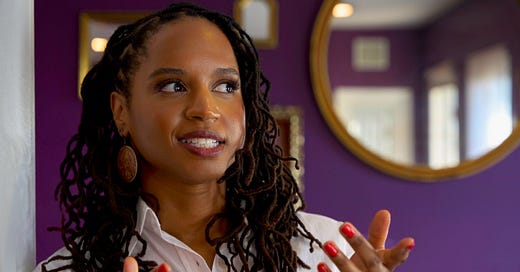


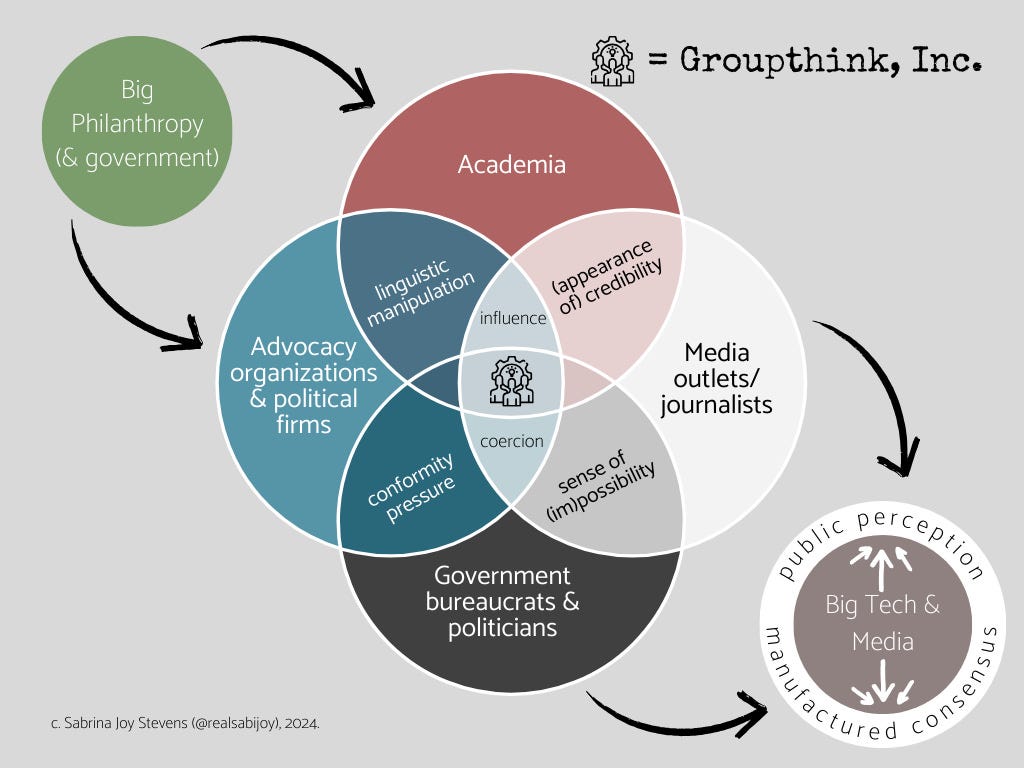
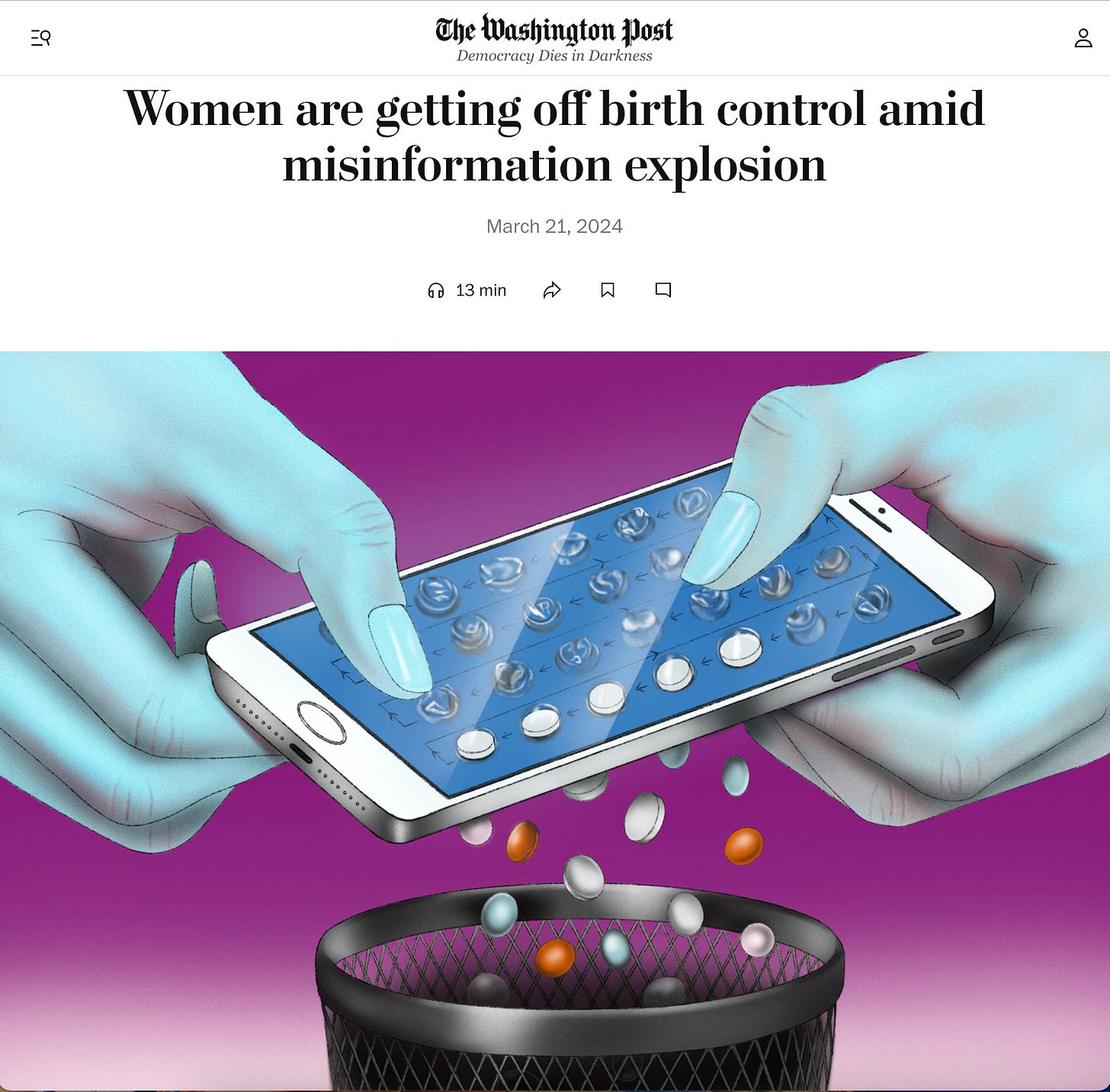
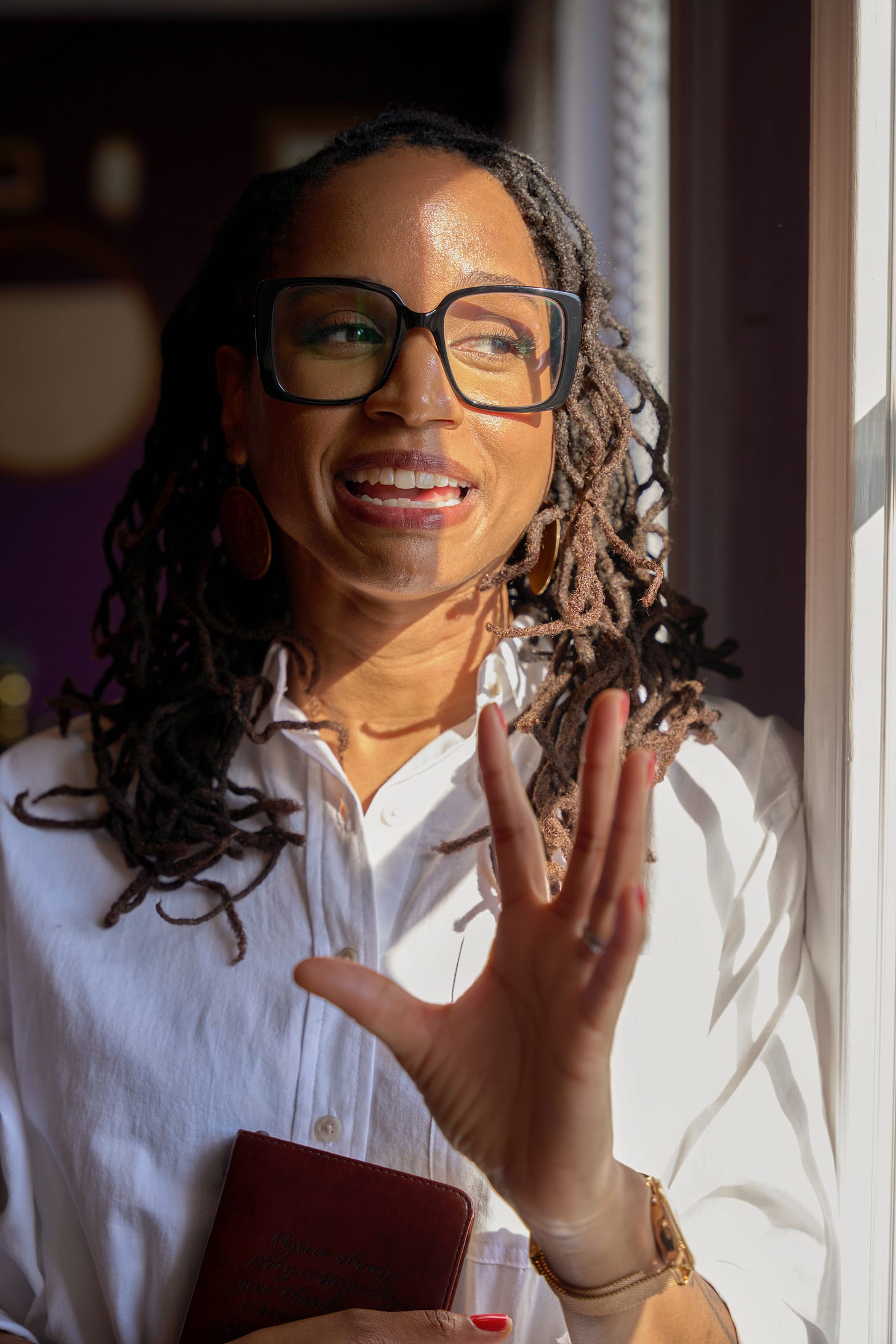
Nicely written and right on point. Congrats on a piece that should be widely distributed, and even more kudos for escaping the bubble.
Bravo. I put more than four decades into newsroom journalism, and can tell you this piece is spot on when it comes to the media echo chamber. Any disagreement with the preferred narrative quickly makes you persona non grata.